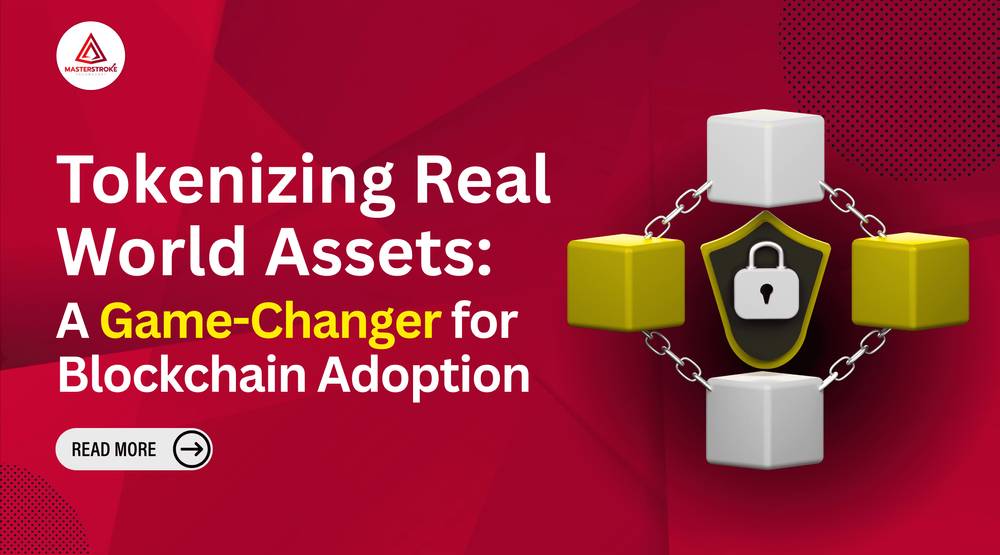The Rise of Real World Asset Tokenization: Blockchain’s Next Big Frontier
 Masterstroke Technosoft
Masterstroke Technosoft
A silent revolution is unfolding — and it’s becoming impossible to ignore. From Twitter threads to boardroom discussions, Real World Asset (RWA) tokenization is setting the stage for one of the most transformative trends in blockchain.
Whether it’s fractionalizing real estate, digitizing gold, or turning invoices into tradeable assets, tokenizing the real world is capturing investor imagination and unlocking new levels of liquidity and access.
The tokenization of real-world assets could be the next big wave in crypto."
— Larry Fink, CEO of BlackRock
What Is RWA Tokenization?
Real World Asset tokenization is the process of turning a physical or off-chain asset — like property, artwork, commodities, or debt — into blockchain-based tokens. Each token represents a legal share or right in that asset, recorded immutably on a decentralized network.
This isn't science fiction. In fact, by 2030, Boston Consulting Group estimates that up to $16 trillion worth of assets could be tokenized, accounting for 10% of global GDP.
These tokenized assets are:
- Legally backed through structured ownership
- Programmable via smart contracts
- Tradeable on global digital marketplaces
- Accessible to both retail and institutional investors
This opens a new investment paradigm where anyone can own a fraction of anything.
How RWA Tokenization Works
The magic behind the scenes is both legal and technical. Here's how it unfolds:
- Asset Selection & Appraisal: A real-world asset is identified and evaluated — be it a property, a painting, or a revenue stream like invoice financing.
- Legal Wrapping: Ownership is placed under a legal entity (such as a Special Purpose Vehicle or trust) that issues corresponding digital tokens on a blockchain.
- Token Minting & Distribution: Tokens are created to represent fractional ownership or revenue rights. These are distributed to investors via compliant platforms.
- Smart Contract Automation: Income distributions, ownership transfers, and regulatory compliance are all handled through tamper-proof smart contracts.
"Tokenization enables not just ownership, but the programmability of value."
— Balaji Srinivasan, former CTO of Coinbase
The Liquidity Game-Changer
In traditional finance, many assets are valuable but illiquid. You can’t easily sell a fraction of your house or a portion of an antique. Tokenization solves that. By turning real assets into digital tokens, markets become liquid, fractional, and 24/7 — enabling:
- Retail investors to enter asset classes previously reserved for the wealthy
- Institutions to offload or trade parts of large holdings
- Assets to be instantly settled and globally accessed
McKinsey estimates that illiquid assets today account for $50 trillion globally — most of which could be partially unlocked through tokenization.
A Shift That Impacts Everyday Lives
This isn’t just an institutional game. The power of tokenization lies in how it empowers the average person.
Imagine:
- Buying $200 worth of London real estate via a mobile app
- Earning passive rental income distributed via smart contracts
- Owning a slice of a Picasso or a classic Ferrari
- Supporting clean energy by investing in tokenized solar projects
And this isn’t just a thought experiment. In countries with limited banking infrastructure or unstable currencies, tokenized assets offer stability, access, and new earning models.
"Tokenization will be the biggest driver of financial inclusion in the next decade."
— Raoul Pal, Macro Investor & CEO of Real Vision
The Regulatory Landscape
For any major financial innovation to scale, regulatory clarity is key — and it’s happening.
- Switzerland and Singapore already offer well-defined frameworks for security token offerings (STOs).
- The EU’s MiCA (Markets in Crypto-Assets) regulation is setting standardized rules across member states.
- In the U.S., the SEC and CFTC are actively exploring how tokenized assets fit into current securities law.
- The UK and Hong Kong are launching sandboxes for tokenized securities experimentation.
📊 2024 data shows that over 65 countries are either piloting or have launched legal frameworks for tokenized financial instruments. As regulation matures, institutional involvement is soaring — with BlackRock, JPMorgan, and Goldman Sachs all running tokenization pilots or platforms.
Why Blockchain Makes It All Possible
Couldn’t this be done on a traditional database? Technically yes — but it misses the point. Blockchain provides what traditional systems can’t:
- Immutable record-keeping
- Transparent auditing for all transactions
- No central authority or trusted third party
- Smart contracts for automatic enforcement
These features make trust programmable, reduce cost, and eliminate settlement risks — the perfect environment for assets that need to be secure and tradeable. Without blockchain, tokenization is just digital paperwork. With blockchain, it’s a new financial infrastructure.
Real-World Use Cases Already in Action
This isn’t theoretical. Projects around the world are actively leveraging RWA tokenization:
RealT: Offers tokenized U.S. rental properties. Investors earn weekly rental income via USDC or crypto wallets.
Paxos Gold (PAXG): Each token represents 1 fine troy ounce of gold, fully backed and auditable. Tradable like any ERC-20 token.
Centrifuge x MakerDAO: Small businesses tokenize invoices to unlock working capital, directly from DeFi lenders.
Franklin Templeton: One of the first major funds to launch a tokenized money market fund on blockchain.
Aspen Digital Security Token: A luxury hotel in Colorado was tokenized, offering shares to global investors via blockchain.
Conclusion
Real World Asset tokenization is more than just another crypto narrative — it’s the foundation for the next era of finance. It merges the trust and familiarity of physical value with the innovation and speed of decentralized technology. With billions already flowing in, a growing regulatory green light, and real products in-market, the trend is gaining unstoppable momentum.
"We are witnessing the beginning of a tokenized economy that could be bigger than the internet boom."
— Cathie Wood, CEO of ARK Invest
Whether you're an investor, builder, or just a curious observer — now is the time to watch this space closely.